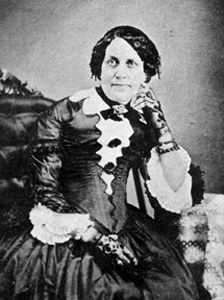 This Goodly Land
This Goodly Land
Caroline Lee Hentz (June 1, 1800–February 11, 1856)

Other Names Used
- Caroline Lee Whiting: birth name
Alabama Connections
- Florence, Lauderdale County: adult residence
- Tuscaloosa, Tuscaloosa County: adult residence
- Tuskegee, Macon County: adult residence
Selected Works
- Hentz, Caroline Lee. Aunt Patty's Scrap Bag. Philadelphia: Carey and Hart, 1846. Rpt. Philadelphia: T. B. Peterson & Bros., 1872. An online version of Aunt Patty's Scrap Bag is available from Google Books.
- Hentz, Caroline Lee. Linda, or, The Young Pilot of the Belle Creole: A Tale of Southern Life. Philadelphia: A. Hart, 1850. Rpt. Philadelphia: T. B. Peterson, 1869. Rpt. Philadelphia: T. B. Peterson, 1881. An online version of Linda is available from Google Book Search.
- Hentz, Caroline Lee. Rena, or, The Snow bird: A Nouvellette. Philadelphia: A. Hart, 1851. Rpt. Philadelphia: T. B. Peterson & Bros, 1869. Rpt. New York: F. M. Lupton Pub. Co., 1869. An online version of Rena is available from Wright American Fiction, 1851-1875.
- Hentz, Caroline Lee. Marcus Warland, or, The Long Moss Spring: A Tale of the South. Philadelphia: A. Hart, 1852. Rpt. Philadelphia: T. B. Peterson, 1869. Rpt. New York: F. M. Lupton Pub. Co., 1889. An online version of Marcus Warland is available from Wright American Fiction, 1851-1875.
- Hentz, Caroline Lee. Eoline, or, Magnolia Vale: A Novel. Philadelphia: A. Hart, 1852. Rpt. Freeport, N.Y.: Books for Libraries Press, 1971. An online version of Eoline is available from Wright American Fiction, 1851-1875.
- Hentz, Caroline Lee. The Planter’s Northern Bride: A Novel. Philadelphia: A. Hart, 1854. Rpt. Philadelphia: T. Peterson, 1870. Rpt. Chapel Hill: University of North Carolina Press, 1970. An online version of The Planter’s Northern Bride is available from Documenting the American South.
Biographical Information
Caroline Lee Hentz was born and raised in Lancaster, Mass. She began writing plays at age twelve. A teacher at age seventeen, she was known locally for her poems and stories. At age twenty-four, Hentz married Nicholas Hentz, a French immigrant who was a teacher, artist, scientist, and author. They lived for two years in Northhampton, Mass., where her husband taught at Round Hill Academy. In 1826, they moved to Chapel Hill, N.C., where he became a professor of modern languages at the newly opened University of North Carolina. In 1830, the couple moved to Covington, Ky., to operate a female seminary. In Covington, Hentz wrote a play, De Lara, or, The Moorish Bride, for a contest sponsored by William Pelby, a Boston actor and manager. Although she won the contest, Pelby was unable to pay the full amount of the $500 prize, so he returned the copyright to her in compensation. The play was staged in Boston and in Philadelphia. Hentz and her family moved to Cincinnati in 1832, again to run a school for girls. While living there, she wrote two more plays and published her first novel, the semi-autobiographical Lovell’s Folly. She also wrote and published magazine articles and short stories.
In 1834, the Hentzes moved to Florence, Ala., and opened Locust Dell Female Academy. Hentz continued writing short stories, which were published in periodicals such as Godey’s Lady’s Book, Magnolia, and the Southern Literary Gazette. In 1843, the Hentzes closed Locust Dell and moved to Tuscaloosa to run the Alabama Institute. In 1845, they moved again, this time to Tuskegee, Ala., where they again operated a girls’ school. While they were in Tuskegee, Hentz published her first collection of short stories, Aunt Patty’s Scrap Bag. In 1848, they moved to Columbus, Ga., to run another school for girls. In 1849, however, her husband’s health failed, and Hentz began to support the family by her writing. From 1850 to 1856, she published eight novels and six collections of short stories. Her books were very popular, best-sellers of that period. In 1852, the couple moved to Florida to live with their older children. In 1856, Hentz died in Marianna, Fla., of pneumonia. Several more short story collections were published by her children after her death.
Interests and Themes
Caroline Lee Hentz wrote domestic novels and short stories (most with Southern settings) which emphasized genteel religious and moral values and frequently featured star-crossed lovers. The Planter’s Northern Bride was a prominent “anti-Tom,” that is, a Southern response to Uncle Tom’s Cabin.
For More Information
Please check your local library for these materials. If items are not available locally, your librarian can help you borrow them through the InterLibrary Loan program. Your librarian can also help you find other information about this author.
There may be more information available through the databases in the Alabama Virtual Library. If you are an Alabama citizen, AVL can be used at your public library or school library media center. You can also get a username and password from your librarian to use AVL at home.
Reference Articles
- Beidler, Philip D. "Caroline Lee Hentz’s Long Journey". Alabama Heritage 75. (2005): 24-31.
- Ellison, Rhoda Coleman. "Caroline Hentz’s Alabama Diary, 1836". Alabama Review 4.4. (1951): 254-269.
- Ellison, Rhoda Coleman. "Mrs. Hentz and the Green-Eyed Monster". American Literature 22.3. (1950): 345-350.
Reference Book Chapters and Encyclopedia Entries
- Williams, Benjamin Buford. "Caroline Lee Hentz, Alabama's First Best-Selling Author"; A Literary History of Alabama: The Nineteenth Century. Rutherford, N.J.: Fairleigh Dickinson University Press, . 170-175.
- Wimsatt, Mary Ann. "Caroline Hentz's Balancing Act"; The Female Tradition in Southern Literature. Ed. Carol S. Manning. Urbana and Chicago: University of Illinois Press, . 162-175.
Reference Web Sites
- Rindo, Ron. "Caroline Lee Hentz". The Encyclopedia of Alabama. 2009. Alabama Humanities Foundation and Auburn University. http://www.encyclopediaofalabama.org/face/Article.jsp?id=h-2449.
Location of Papers
- University of North Carolina at Chapel Hill
Photo courtesy of the Alabama Department of Archives and History.
Last updated on May 30, 2008.